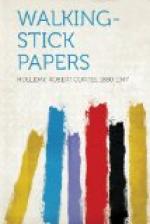City directories, telephone “books,” social registers, “Who’s Whos,” all are necessary to enable him to tell the addresses of his friends. And these are inadequate. He wishes to send, as a token of his regard, a book, affectionately inscribed, to his friend, let us say, J. M. D——, Esq. We learn by the agency of the machinery to which we have recourse that there reside in the City of New York four gentlemen of this identical name: one on Madison Avenue, one on Ninety-first Street, another in Brooklyn, the other somewhere else. Mr. Page is completely bewildered as to which is his friend. “Well, I don’t know,” he says, “but this man married former Senator So-and-So’s daughter.” Now, can’t we solve that, somehow? Historic Spirit! we cried that day, impracticality of literary men for petty, mundane details, here hast thou still thy habitat, a temple in Mr. Page!
Lor’, how we do run on!
XIII
CAUN’T SPEAK THE LANGUAGE
Whenever we go to England we learn that we “caun’t” speak the language. We are told very frankly that we can’t. And we very quickly perceive that, whatever it is that we speak, it certainly is not “the language.”
Let us consider this matter. A somewhat clever and an amusingly ill-natured English journalist, T. W. H. Crosland, not long ago wrote a book “knocking” us, in which he says “that having inherited, borrowed or stolen a beautiful language, they (that is, we Americans) wilfully and of set purpose distort and misspell it.” Crosland’s ignorance of all things American, ingeniously revealed in this lively bit of writing, is interesting in a person of, presumably, ordinary intelligence, and his credulity in the matter of what he has heard about us is apparently boundless.
However, he does not much concern us. Well-behaved Englishmen would doubtless consider as impolite his manner of expression regarding the “best thing imported in the Mayflower.” But however unamiably, he does voice a feeling very general, if not universal, in England. You never get around—an Englishman would say “round”—the fact over there that we do not speak the English language.
Well, to use an Americanism, they,—the English,—certainly do have the drop on us in the matter of beauty. Mr. Chesterton somewhere says that a thing always to be borne in mind in considering England is that it is an island, that its people are insulated. An excellent thing to remember, too, in this connection, is that England is a flower garden. In ordinary times, after an Englishman is provided with a roof and four meals a day, the next thing he must have is a garden, even if it is but a flowerpot. They are continually talking about loveliness over there: it is a lovely day; it is lovely on the river now; it is a lovely spot. And so there are primroses in their speech. And then they have inherited over there, or borrowed or stolen, a beautiful literary language, worn soft in colour, like their black-streaked, grey-stone buildings, by time; and, as Whistler’s Greeks did their drinking vessels, they use it because, perforce, they have no other. The humblest Londoner will innocently shame you by talking perpetually like a storybook.




